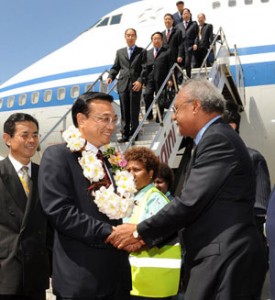
Papua New Guinean Deputy Prime Minister Puka Temu greeting Chinese Vice Premier Li Keqiang upon his arrival in Port Moresby, Papua New Guinea, on 3 Oct 2009. (Xinhua/Liu Jiansheng)
Islands Business | July 2010
BUSINESS: BIG PUSH FROM FOREIGN INVESTORS INTO PNG
Now education needs to change its focus Oseah Philemon Applications from foreign investors are “flooding in”. And they’re asking the Department of Lands and Physical Planning for land to set up their business in Papua New Guinea, says PNG’s Deputy Prime Minister Sir Puka Temu. Temu who is also the Minister for Mining and Lands and Physical Planning in the Somare-led government said that with Papua New Guinea now seen by investors as a safe destination for investment, investors are sending volumes of applications to the department asking for land to set up their businesses. “China is coming in a big way. It is very important…it is a big player globally and they are becoming very innovative.” Temu said investors are interested in land for a whole range of businesses including mining exploration. With the help of the European Union, PNG has now been mapped out and investors can see where mining deposits are located. The mapping process will be concluded next year. “So with that technology, we know we still have an enormous potential in mining. “Exploration is not small money, it is big money and with the MRA (Mineral Resources Authority), we are moving the applications very, very quickly,” said Temu. Investors particularly from China, Malaysia and Europe are also looking for land for agriculture. “They are looking at how Papua New Guinea can grow rice, not small plots…they are looking for 100,000 hectares to make Papua New Guinea a food bowl because the global rice production is going down and PNG is recognised as having the land to become a major rice producing country in the world. “And so our challenge is how do we get 100,000 hectares,” he said. Temu said under the recent amendments to the land laws, customary landowners can now register their land and then lease it out to businesses. But the challenge for the government is to turn to traditional landowners to release their land for this purpose. Under the new changes, the security of titles for traditional land is as good as State lease and that is what investors want—security of titles, he said. “We have Indonesians and Malaysians coming in and saying we want 100,000 hectares to make PNG a rice producing country,” he said. One area that has been identified is in the Kairuku area below the Golilala mountains and around the Vanapa area—not far from the capital Port Moresby, and in the Central Province where a lot of land is available. In the past, rice was grown in the Bereina area of the Central Province. Temu said there is also a lot of interest in oil palm development as well. And the government has identified “corridors” in the country for agricultural development. As the government of Papua New Guinea focuses on bringing in more investors, it is also focusing its attention on manpower development to ensure the nation’s human resources are developed to take on the new challenges ahead. Recently, Temu told a University of Technology graduation in Lae that the government will expand national high schools and integrate them with universities in Papua New Guinea.Propelling PNG into the future This will be done as one of the numerous strategies under the country’s Vision 2050, aimed at propelling PNG into the future. Temu said under the strategic development plan, state universities will be expanded while the government will support private universities and other tertiary institutions. The government has also approved the establishment of an industrial technology and development institute, as well as a PNG Open University to coordinate flexible learning programmes of four state-run universities—University of Papua New Guinea, University of Technology, Goroka University and Vudal University. Temu told Unitech staff, graduating students and visitors that a white paper in higher education has urged PNG to reduce its dependency on foreign expertise and take control of its own future by increasing citizen participation, management and control in important areas of the economy, government and community affairs. However, he said according to the National Development Strategy 2010-2030, PNG will require around 265,000 graduates from tertiary institutions between 2010 and 2030. The current capacity of the six universities—four government-run and two church-run put together—is about 7,000 per year which is well below the requirement, Temu said. Existing tertiary institutions are not able to produce all of the manpower required by the industries. Temu said PNG currently spends some 780 million kina to hire foreign consultants to address the shortfall in the workforce. He also told the Unitech graduands that it is time some of them started thinking about going to work in the rural areas instead of seeking employment only in the cities and towns. “I believe it is now time for higher education institutions like Unitech to start preparing our young, educated and creative minds to seek wealth creation opportunities in our rural areas, instead of looking for jobs in our towns and cities,” Temu said. He went further to say: “In this regard, I propose that Unitech and other higher education institutions in PNG cultivate and encourage the mentality of “university education for innovation, entrepreneurship and self-employment” instead of the current mentality of “university education for a well-paid job. “This is the kind of paradigm sh ift we want to see in our higher education system when we implement PNG Vision 2050,” Temu said.












